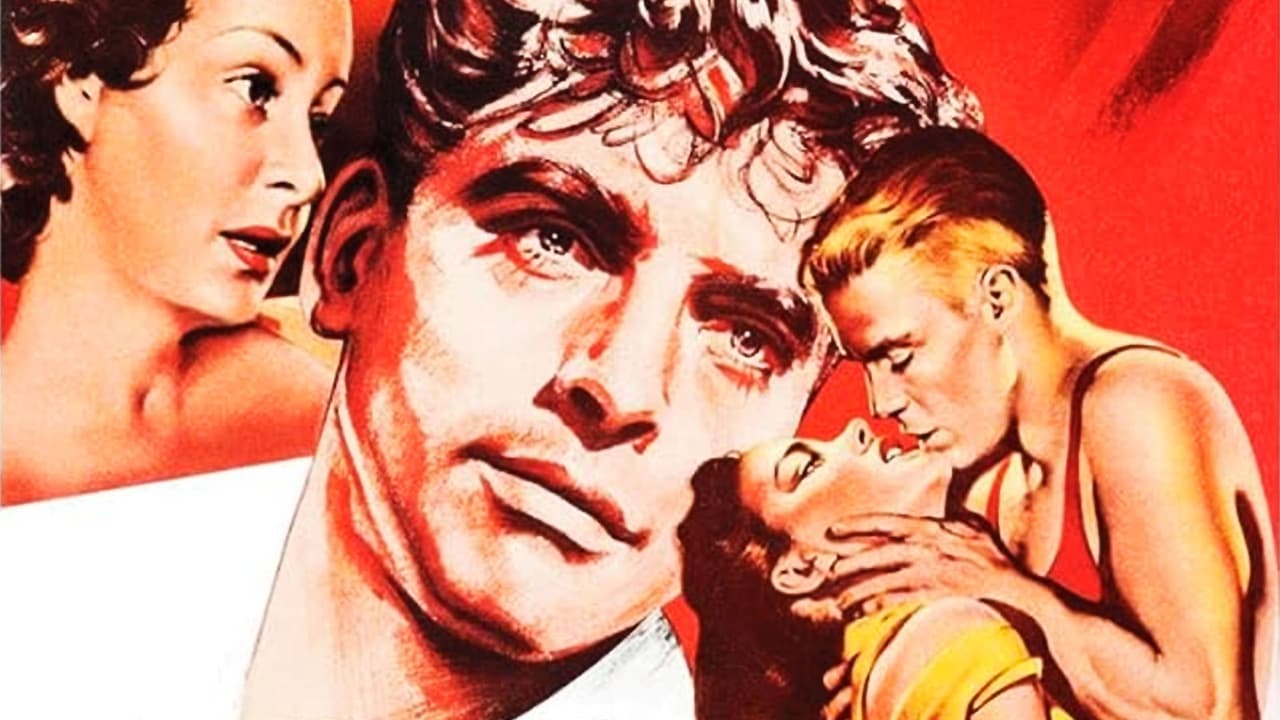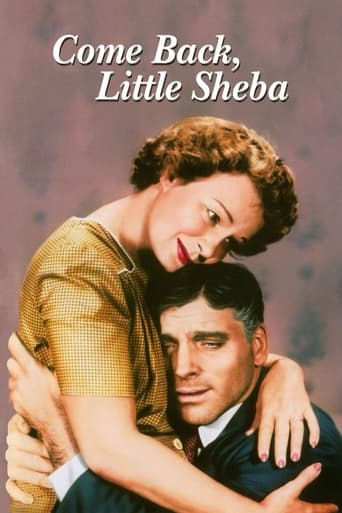

What is so great about a movie like this is that it touches on what I imagine must be somewhat common feelings among some people middle-aged or older, whether they themselves have felt that way, or know someone who did, about what it is like to feel one was robbed of some of life's opportunities.Shirley Booth really shines in the role of Lola, and one can see why she won the Academy Award for her work here. For much of the movie, she will occasionally call out for "little Sheba", their dog which has gone missing for quite some time, recalling fondly the good times they had had together and how much the dog meant to them.Burt Lancaster plays Doc Delaney, a recovering alcoholic, whose medical career was interrupted when he had to marry Lola, apparently due to an unexpected pregnancy. This meant he could no longer afford to continue with medical school, as a result of which he became a chiropractor. To make matters worse, Lola lost the baby and could never have any more children. As we meet the Delaneys in the movie, we learn that Doc has been attending AA meetings for some time now, and appears to have successfully quit drinking. The movie opens with Lola showing a room in the Delaneys house to Marie Buckholder (Terry Moore), a young college student who eventually moves in, with Doc's approval. Marie has a boyfriend/fiancée who isn't seen in the early part of the movie, called Bruce, but as we get to know her she is also going out with a college athlete named Turk (Richard Jaeckel), who occasionally poses for her (she's an art student), and he is all arms with Marie.Doc starts showing some well-founded concern for Marie, and seems especially worried that Turk is the kind of young man who might not have enough respect for her; he really starts becoming concerned after the two youngsters start spending time together, and the movie subtly suggests that he is concerned that Marie might meet with a somewhat similar future as Lola.At one point, Lola realizes that Doc has apparently started drinking again, when the lone whiskey bottle in their kitchen suddenly goes missing. It's not long before she has to face the facts and try to help Doc from relapsing completely into his old alcoholic ways; he seems to have been unable to handle even the simple glimpses of the impending romantic life of young Marie.Well acted and directed, Booth's Lola can still be quite irritating. Doc gives little hints into what is going on in his head since he helps other alcoholics who are brought into the hospital and mentions to Lola that "most alcoholics are disappointed men". Ouch. Even though Doc didn't mean that as a slap in the face the conclusions are easily drawn. She keeps mentioning the prayer that alcoholics say part of which is "God, grant me the serenity to accept the things I cannot change". But then she keeps bringing up to Doc the past that cannot be changed, even though Doc tells her quite gently to leave the past behind.I'd recommend this one if it ever crosses your path.
... View MoreShirley Booth (of "Hazel" fame) and Burt Lancaster are married, but don't really communicate in "Come Back, Little Sheba." The film opens on Shirley who gets out of bed and moves about with no motivation to do anything, to dress, to clean. She has a likable disposition, but she doesn't have much drive. Her husband is a chiropractor, who never finished his medical schooling as a doctor, for reasons that are shown to us slowly throughout the film. Little Sheba is a dog they had that ran away and that Shirley has been praying will return. Burt Lancaster is excellent as the husband who just goes through the motions day by day without feeling. Terry Moore is a boarder who they take in for more income, of whom Burt takes a liking to. And, also, he is an alcoholic who has been sober for years and whose world will soon shatter. But this is Shirley Booth's picture, as she breaks your heart. She is both pitiful yet strong in conjuring up the depths of depression. Shirley deservedly won an Oscar for this film. What secrets are behind this façade? Will she come out of her delusions? This film is definitely worth your time. Please look for "Come Back, Little Sheba." It's an experience you won't forget.
... View MoreOne thing for sure—the film certainly goes against the glamorous 50's mold. Probably no movie from that prettified period is as dour as this one, from the dowdy Lola to the grim- faced Doc to the bleak photography to the plebian sets. I kept yearning for lively little Marie (Moore) to bounce in and give my eyes some relief. My guess is Hollywood was out to show Broadway that they could entrust their Meaningful stage plays to the notoriously commercial West Coast.Sure, Booth gets the spotlight and responds by emoting like she's on New York's center stage. But with that whiny voice and desperate demeanor, she's more pathetic than sympathetic. Then again, that may be the point, but you've got to wonder why the hunky Doc (Lancaster) stays with her in about as egregious a piece of visual miscasting as I've seen. But then maybe he too pities her long lost youth that won't ever come back no matter how hard she yearns. Looks like they're both paying a price for a mistake made years earlier. Of course, as might be expected, the screenplay's loaded with symbolism, especially her "dream" soliloquy. So get out your Freud if you care to.In my little book, the movie amounts to a one woman show that hasn't worn well, despite the studio's good intentions. Then too, catch that pat, unconvincing ending, so typical of the time. The dour production, however, does manage to put a dent in the bosomy Technicolor spectacles that ruled the 50's Hollywood roost. I'm just glad the talented Booth eventually moved on to TV and the less stagy Hazel (1961-1966).
... View More"Come Back, Little Sheba" is a very worthy addition to Hollywood's canon of films about alcoholism such as "The Lost Weekend", "Days of Wine and Roses", "The Country Girl" and the more recent "Changing Lanes". Each film has it's own peculiar angle on the subject. "Come Back, Little Sheba" is about relapse. Burt Lancaster plays a violent drunk who's been clean and sober for a year. Life is getting better and patients are returning to his chiropractic practice. He's doing everything he should be doing according to the suggestions made by Alcoholics Anonymous. He's attending meetings, he's in close contact with his sponsor, and he's helping other alcoholics, reaching out to those who bottom out at the City Hospital's drunk ward.But there are problems. They have to do with his home life, particularly his derelict and patronizing wife (Shirley Booth) and a pretty co-ed (Terry Moore) who moves in as a boarder. She's ripe with sexual allure and juggling one too many boyfriends. Lancaster's character is emotionally distant to begin with - always seeming a little wound up inside - and doesn't know what to do with his emotions except to drink them away. The film appears to have been written by someone with considerable knowledge of A.A. It portrays the dynamics of a relapse with considerable understanding and shows how an alcoholic will reach his old bottom again with terrifying speed. Both Booth and Lancaster are game, but the naturally charismatic and athletic Lancaster seems a little hemmed in.
... View More